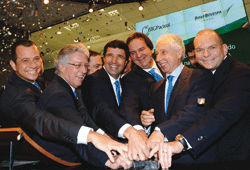BTG Pactual priced its initial public offering in the middle of its range, despite being more than three-times oversubscribed and closing its book a day ahead of schedule.
The bank priced at a level that emphasizes deal performance over maximizing value, choosing a price of R$31.25 ($16.43), right in the middle of its range of R$28.75 to R$33.75, despite having sufficient demand to price at the top.
It sold units, each of which represents three shares in the bank and three shares in its private equity arm. It listed 117 million units for a total of R$3.7 billion, making it Brazil’s 16th-largest public company.
BTG was global coordinator, and Banco do Brasil, Bradesco BBI, Citi, Goldman Sachs and JPMorgan were joint bookrunners. Deutsche Bank, Morgan Stanley and UBS were lead managers.
The decision on pricing had a positive effect on post-deal trading, with the stock rising by more than 3.5% on the first day, before falling back to close 0.64% up. "It was a smart move," says one banker close to the deal. "It will please investors."
The mid-range of the scale estimates a valuation of about $14.5 billion, or 2.5-times book value, compared with two times or lower for the commercial banks. However, BTG’s structure – with a mix of asset management, private equity and investment banking services – makes valuation and direct comparisons difficult.
"It’s not cheap, but it’s a very integrated model and it has very few competitors, if any, that are able to execute in the same way they do," says one banker. "It is a very attractive model and one that has been delivering a 25% return on equity, which, if you put it side by side with the commercial banks, is a substantial spread.
"If you are a portfolio manager and you need to allocate a percentage to financial services, then BTG is, from various angles, a better bet than the commercial banks."
The banker says the level of demand also showed that the bank’s management team did a good job of defusing the only prominent investor concern that was evident on the roadshow. "A significant proportion of the revenue composition comes from proprietary trading," he says. "That consumes capital, and it’s risky capital. Investors were questioning how stable those returns would be and how much volatility that might add to results."
 |
| The chiefs ring the bell for trading on the day of BTG Pactual’s IPO |
He says the emergence of news that chief executive André Esteves had been fined by European authorities for insider trading – he is to appeal – had no impact, and that the executive share programme had been a key positive with investors. However, the problems dogging the Brazilian IPO market persist. BTG Pactual’s IPO was sandwiched by those for Locamerica, a car rental company, and Unicasa, a furniture maker. Both these deals priced below their ranges.
"BTG’s IPO was large and liquid, and offered access to a unique business with a strong management team and a demonstrable track record," says one Brazilian equities banker. "That’s the exact opposite for Locamerica."
Locamerica’s weak performance – it priced a small$167 million deal at R$9 per share, below its range of R$11 to R$14 million – was widely expected. "All it brought [to the market] was a discounted valuation," says one banker, noting a discount of more than 50% compared with the strong market leader Localiza.
There was greater expectation that Unicasa might have a successful deal. Unicasa had, according to one investor, a good track record, strong growth prospects and has no direct competitors within the broader retail segment. Its bookrunners – BTG Pactual, Itaú BBA and Santander – had also been heard talking up a strong order book in the last couple of days, but it too priced well below its range of R$16.50 to R$20.50 at R$14.00
"The market is still very selective and very demanding – that was the theme last year and that continues," says one banker. "The good stories that fit investors’ profiles will continue to do well, but not everything will fly. You need to come with strength on several fronts, including quality and track record."
Companies in the pipeline that bankers say have these characteristics include Seabras – which in mid-April again postponed the timing of its IPO – CVC, Taesa, Queiroz Galvão Perfurações and CPFL.
However, some doubt the speculation that about 40 such companies are ready to come to market before the end of the year.
"I don’t think there are 40 names of the calibre that would be needed to come in the current market," says one banker. "If we see momentum beginning to build and the market beginning to take a more risk-on approach, maybe we can see smaller companies or those with a more greenfield approach having an opportunity to raise capital in the market. But that’s yet to be seen."
